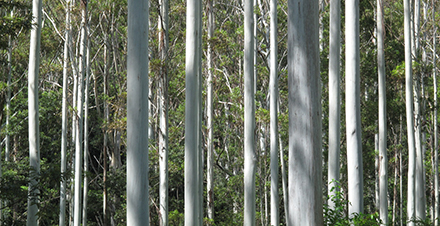The Environmental Defenders Office is heading to the Federal Court to challenge a New South Wales Regional Forest Agreement. Originally signed between the Commonwealth and New South Wales in 2000, it was renewed in 2018 for another 20 years with rolling extensions that could continue indefinitely. Source: Timberbiz
The North East RFA covers logging in the coastal area between Sydney and the Queensland border. It exempts logging in native forests from federal biodiversity law.
If the EDO is successful, the north coast of NSW will be subject to the Environment Protection and Biodiversity Conservation Act.
As a result, any forest operation would have to undergo an environmental impact assessment before approval could occur. It would also put all RFA agreements in Australia in jeopardy.
The EDO, acting on behalf of the North East Forest Alliance will argue that when the North East RFA was renewed, the Commonwealth did not have regard to endangered species, the state of old growth forests or the impacts of climate change, as the EDO will argue it was required to do.
NEFA is asking the Federal Court to declare that the North East RFA does not validly exempt native forest logging from federal biodiversity assessment and approval requirements.
“We are challenging the Federal Government over its failure to assess how another 20-plus years of logging, against a background of a changing climate, will impact our forest ecosystems, endangered species and old growth forests,” EDO Chief Executive Officer David Morris said.
“The Commonwealth didn’t want to incur the costs of conducting a proper assessment, waving through a 20-year extension of native forest logging without proper scrutiny.
“Under the current system, if a population of koalas is being threatened by a new development, the project needs to be assessed at the Federal level. But if the same population of koalas is being threatened by a logging project, it’s been rubber stamped on the basis of 20-year-old environmental assessments,” he said.
“We have known for years that as the climate changes, fires will follow. And yet the North East RFA was renewed without an assessment of how climate change will impact the health and resilience of our native forest ecosystems. Less than 12 months later, fires began ravaging native forests across the region.
“This RFA is a powerful instrument that allows the forestry industry to bypass Federal biodiversity assessments. To be robust, these agreements must be founded on the latest scientific knowledge on climate and the state of our forest ecosystems.”
Australian Forest Products Association NSW CEO Sue Grau has labelled the claims as time wasting and inappropriate.
She said that in recent months the High Court and the Federal Court respectively hade rejected similar claims attempting to undermine the RFAs in Tasmania and Victoria.
“Australia’s rigorous RFA framework has withstood these claims, with the courts holding that RFA forestry operations operate with strong environmental controls and in parallel with the Environment Protection Biodiversity and Conservation (EPBC) Act,” Ms Grau said.
It is the first legal challenge to an RFA in New South Wales and is believed to have taken three years to prepare the case.
In May this year VicForests successfully appealed against restrictions imposed on its operations by the Federal Court last year.
Appeal Justices Jayne Jagot, John Griffiths and Sarah Derrington determined VicForests’ forestry operations covered by Regional Forest Agreements provide all the environmental protections required by national environmental laws.
They said the original judge in the action, brought by the Friends of the Leadbeater’s Possum, erred in finding forestry operations needed to comply with RFAs to remain exempt from the Environment Protection and Biodiversity Conservation Act.
Following that decision Assistant Minister for Forestry and Fisheries Jonno Duniam said he was unwavering in his support for the forestry industry.
“The government is committed to Regional Forest Agreements to provide resource access and a stable investment environment to the forest industry,” he said.
In May the Senate agreed to recommended changes to the Regional Forest Agreements framework to give operational certainty that the native forest industry has been seeking.
Timber NSW declined to comment.






